Recently
Saturday, 29 February 2020 · 25 min read · thoughts
Recently is a periodic retrospective.
At the end of a month I publish a review of things I read/wrote/built/thought over the past month. My goal is to create a ‘brain log’ where I can capture these ideas on paper for future me to review.
Why Now
I first started doing these retrospectives in 2015.
Recently, I’ve been reading about Building a Second Brain. It led me to review my own information capture processes. I’ve been using Wunderlist to keep track of everything for many years.
It’s easy to capture ideas and tasks with Wunderlist, but it’s not great for longform ideas. There’s also a tendency to have lists grow and grow. I’ve developed a habit of pruning lists regularly to prioritize and remove tasks as new information emerges, but I think it’s about time I refactor my workflow. I’ve already begun to migrate parts of my system to Notion.

One thing I noticed during this review was how my past Recentlies turned out to be very valuable. This habit was originally inspired by Tom MacWright who did the same. With Recentlies, I got to see what ideas I was working with in the past and which ideas continue to be relevant in the present. Expect more of this content in the future.
Table of Contents
Writing
Writing is an important part of my thinking process. Somehow, putting words on paper and moving paragraphs around helps you shape your inner thoughts. This month, I’ve been spending a lot more time learning about private currencies and distilling what I’ve learned:
You can think of these summaries as my ‘second brain.’ A lot of the material on this blog are really notes to myself. Even today, I continue to come back to content I wrote in the past.
I’ve always loved economics as a subject in school, so I had fun reading classic texts like Hayek’s Use of Knowledge in Society and Menger’s Origin of Money. It’s amazing how something like money can emerge spontaneously, and coordinate humans in an efficient knowledge-minimized way.
I started reading these books because I’m revisiting an old side project: Patronage Tokens. This project has been in the backburner for over a year. Recently however, there’s been a lot of attention in the Ethereum community around personal tokens. It seems like the right time to reboot it with newly acquired ideas.
Thinking
My History with Creators
Ever since I worked on SheetHub back in 2014, I’ve always been obsessed with building new monetization models for creators. Back then, I saw that my favourite guitar channels on Youtube were using obscure file hosting services to host their Tablature PDFs. Links would break regularly or go to a hosting site in a foreign language.
Sometimes the best way to come up with startup ideas is to ask yourself the question: what do you wish someone would make for you?
Frustrated, I created a sheet music marketplace to help creators host and sell their arrangements. Creators could use the earnings to support their channel; Fans would have a stable library of content. The platform reached a few thousands users in less than a year.
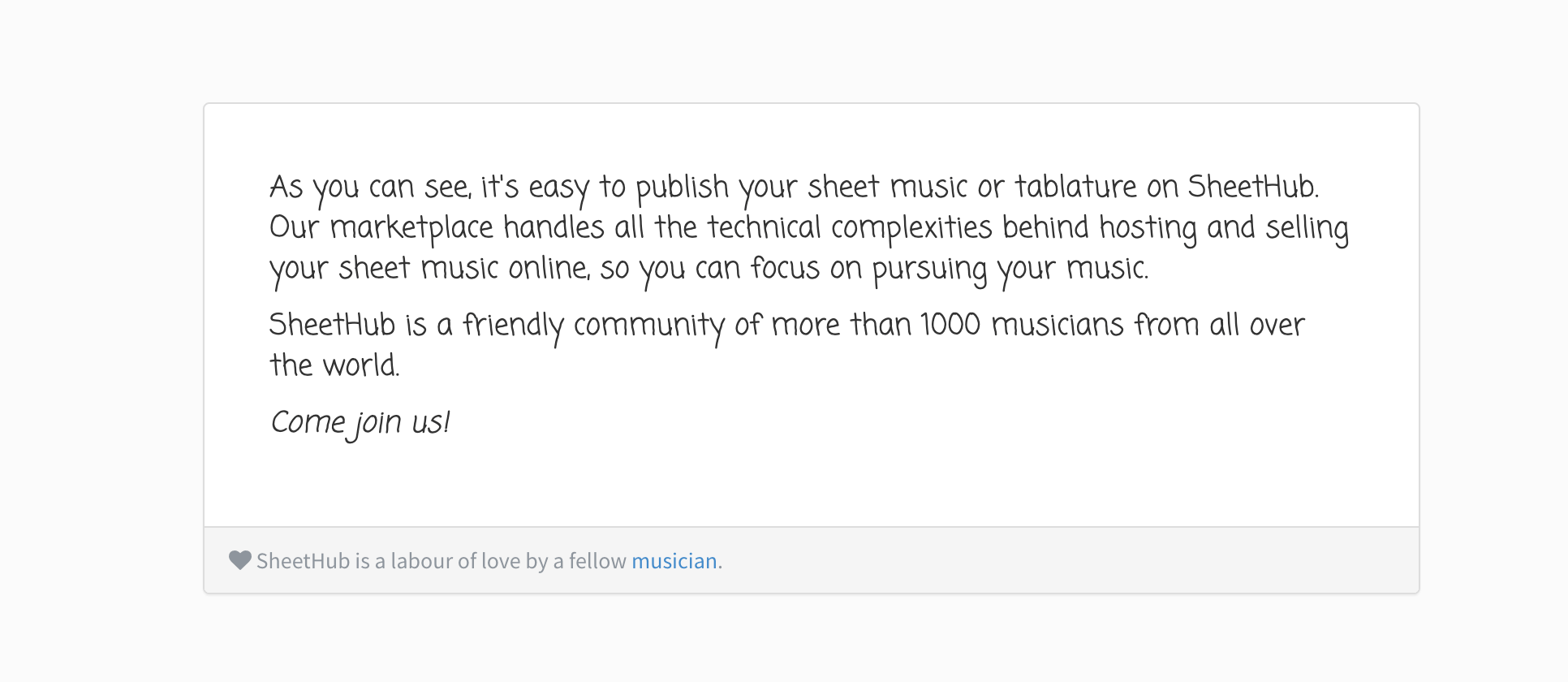
SheetHub caught the attention of BandLab and after meeting the team, I decided to join the company and continue my mission of empowering creators for a much larger community. During my time there, I spearheaded the Tip Jar feature (now BandLab Albums) which allows musicians to receive money from fans who want to support them directly.
When I worked on Sheethub, one of the major problems I intended to solve was cover attribution. Covers of original music pieces (the majority of content on Youtube) were in a legal grey area, since it’s made without the permission of the license holder. But what if we could attribute the original license holders and route a percentage of earnings to them? After speaking to several music publishing houses, I decided that changing how a whole industry works is an unreasonably large undertaking for one person.
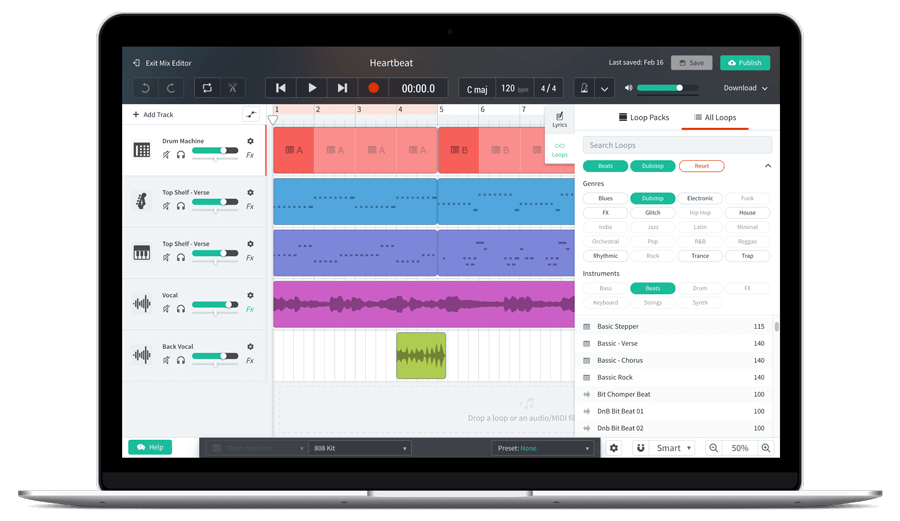
We ran into a similar attribution problem at BandLab. On the platform (think of it as Github for musicians), users can create tracks, fork, and merge other tracks into its own work. Sampling and remixing is a long-held tradition in music. However, since a track can consists of works from lots of authors, where should revenues from the music go to? We would need a database to keep track of information about music attribution, but every publisher has their own database.
I spent a few weeks looking at smart contracts and Ethereum to see if we could prototype a solution to this problem. However, we decided to prioritize other features which were more immediately valuable to our users.
Patronage Tokens
It was some time in late 2018 when I was neck-deep into smart contracts and decentralized applications that I started thinking again about creators. I’d come across KMikeyM many years ago and now wondered if individuals could crowdfund in a similar way using crypto.
Initially called youTokens, μTokens, or pTokens (for patronage), the Patronage Token model I arrived at can be found here.
I had a semi-working prototype, but the UX was horrible. This was the dark ages of dApps, before meta transactions and hosted wallets started to bring in UX improvements.
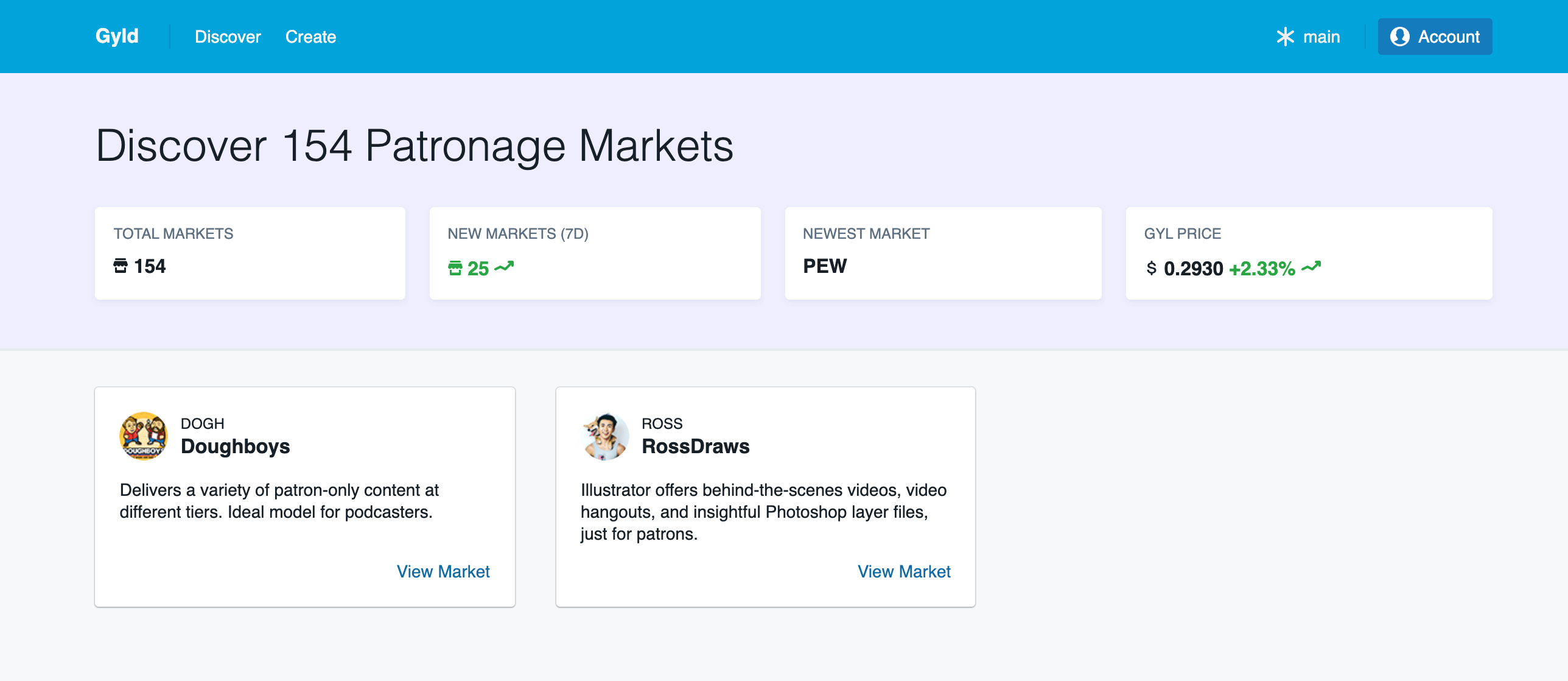
You would go on this platform and browse ‘Patronage Markets’, a gamified market-like system that lets you invest in your favourite online creators.
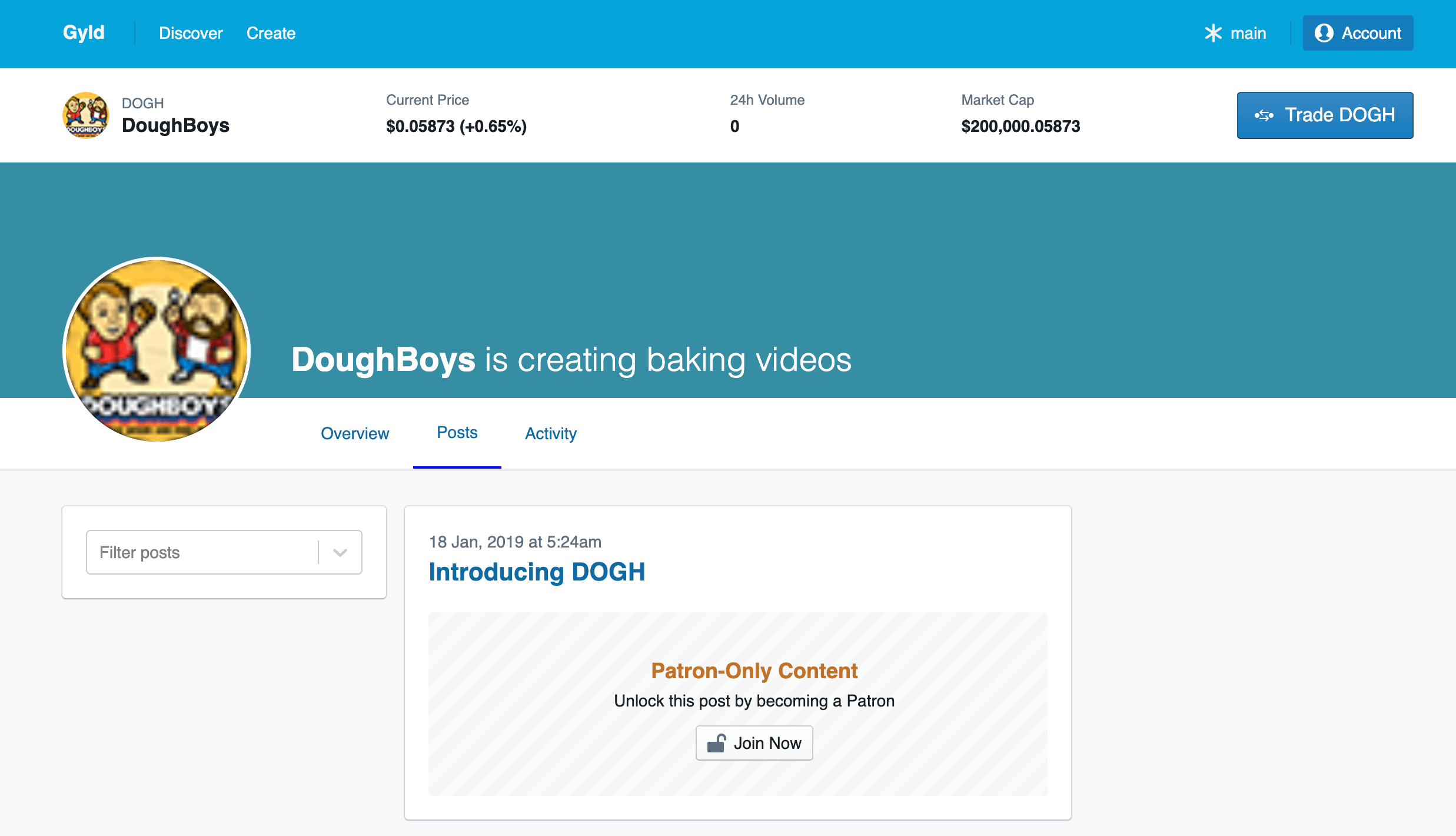
Heavily inspired by crowdfunding platforms like Patreon, the dApp lets you unlock exclusive content by having a crypto subscription.
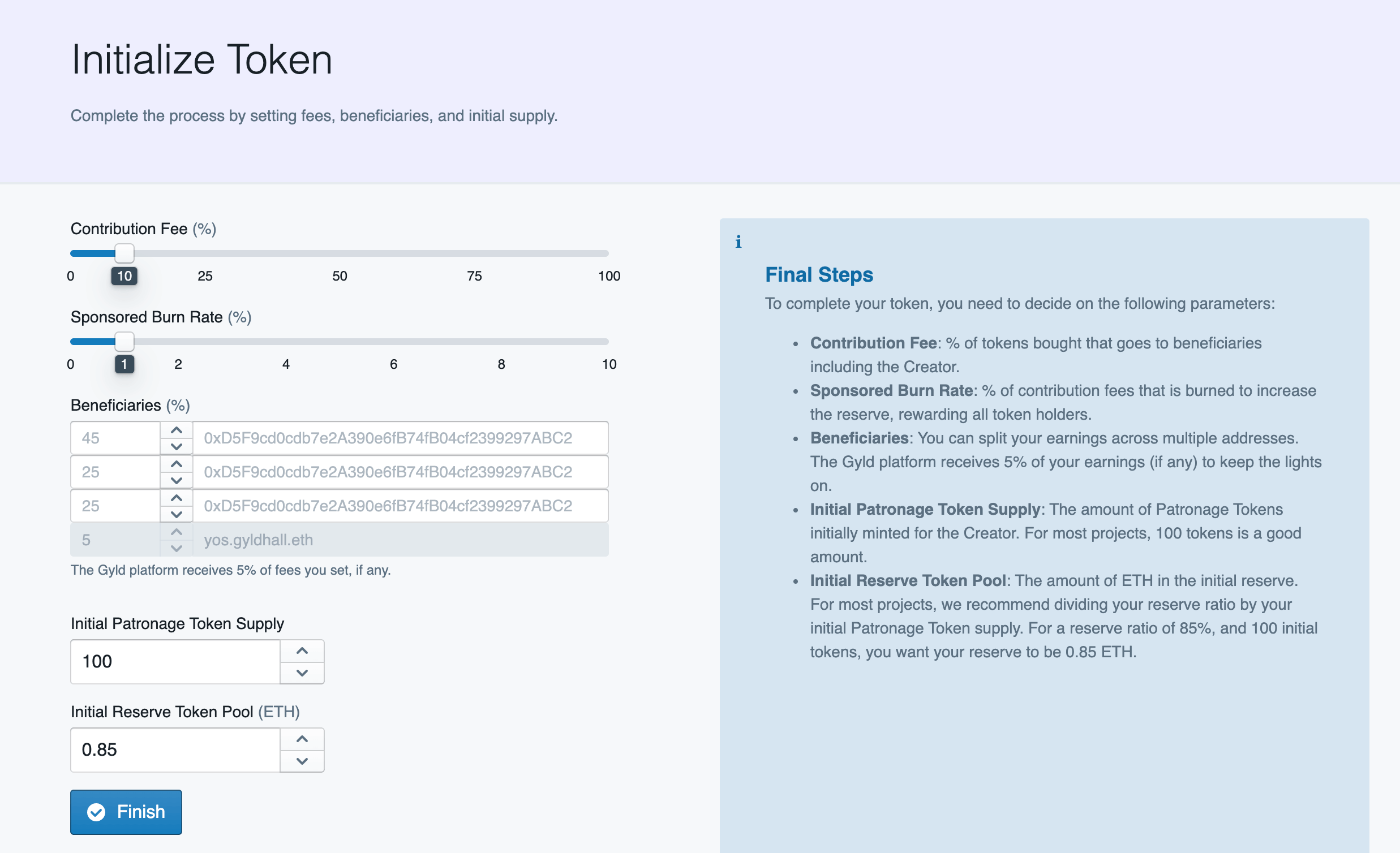
What stopped the project in its tracks was its token model. Patronage Tokens used a Bonding Curve, similar to DAICOs and Continuous Organizations.
Here’s how bonding curves work: As the token supply goes up, so does its price. There are lot of issues with this:
- A dynamic unit price makes economic calculation difficult.
- A strong tendency towards speculation & ponzi schemes.
- Bonding curve parameters are difficult to explain.
- Frontrunning potential can lead to guaranted losses.
While a collateralized token model is an improvement to your usual ICO, the bonding curve introduces its own set of problems.
I went back to the drawing board for a few months with no real progress. Failing to come up with a design I was satisfied with, I decided to ‘think slow’ and enter into learning-mode, seeking to find ideas from the rest of the web3 space that might help me come up with solutions.
Next Steps with Patronage Tokens
Since then, I’ve learned about different web3 projects and DeFi protocols: money markets, stablecoins, synthetics, etc. The sophistication of the tools and building blocks in the space has increased, making decent UX finally possible.
I’ve come up with an updated design.
The new Patronage Token (no longer called that) builds on the innovations from DeFi and from research on privately minted medieval coinage. It addresses the problems of the original model and simplifies many aspects of the user experience. The goal is to empower creators in novel ways, using crypto.
Other Trends
- Vtubers might be on a breakout trajectory right now.
Thoughts
- Ideas possess people, not the other way around. They live rent-free in your head and infect you with an obssessive fascination towards it.
- When building a product or API for developers: If there’s no documentation of it, it doesn’t exist.
- If you can’t explain it simply, you don’t understand it well enough.
- You cannot control the outcome, but you have 100% control of the effort.
- Don’t envy others. Set high standards of yourself and push yourself to do better each and every week, month, year. But always remember, your primary competitor is yourself not others.
- What’s missing or broken in your daily life? Sometimes if you just ask that question you’ll get immediate answers.
- To receive more value, bear more costs and risks.
- If you take on accountability and solve problems on the edge of knowledge that others can’t solve, people will line up behind you.
- The knowledge and skills you gain by developing a founder mentality will set you up to be a founder down the line.
- Most knowledge worth having comes from practice. It comes from doing. It comes from creating.
- The more you make, the more you learn.
- Creating something of true significance starts with seeing things others do not.
- Execute on what is possible with no funding first.
Speaking
I’ve been rewatching my talk videos, and I’m still not at the level I want to be at. The quality of my delivery is bad. I use too many filler words. I did not rehearse well enough.
To be fair, I’ve gotten better compared to when I first started. I’ve had people tell me that my content is well-structured and easy to follow.
Moving forward, I want to make a conscious effort to improve my speech. Practice makes perfect.
Reading
- Going Pro: Lifestyle Systems for the Exceptional Developer
- The Craft of Writing Effectively
- Social Resurgence
- Social Crypto
- The Myth of The Infrastructure Phase
- The perks of patronage
- The independent researcher
- The economics of social money
- The rise of YOU token
- The Governance-Minimized Decentralized Stablecoin
- The Origins of Money
- Theory and Brief History of Money and Banking
- Ethics of Money Production
- Tragedy of the Commons
- Quantity Theory of Money
- Liberation through Radical Decentralization
- The Apprenticeship Model
- Why we’re excited about Roll — the protocol for social money
- Using Social Money to Build Open Communities
- Build the Economy of You
- The Personal Token Revolution
- Progressive Decentralization: A Playbook for Building Crypto Applications
- 100 True Fans
- The Gluing Manifesto
- Don’t Push
- Roads and Bridges
- The Network Effects Bible
- The Developer’s Dilemma
- Continuous Securities Offerings
- The Passion Economy and the Future of Work
- The biggest risk for Passion Economy startups
- Community-as-a-Service, or how to monetize access
- What is the definition of a “creator”?
- Paid Groups & The Passion Economy
- Enterprization of consumer
- The “influencer stack” and China’s influence incubators
- Crypto memes and adoption
- Bitcoin Standard
- Denationalization of Money
- Choice: Cooperation, Enterprise, and Human Action
- KMikeyM vote on crypto
- 9 Habits of World Class Startups
- 10 Places to Find Product-Market Fit
- A handy guide to financial support for open source.
- Non Fungible Tokens Bible
- Thin Applications
Playing
Here are the guitar pieces I’ve been playing this month:
Others
- I updated the design of this website for the umpteenth time.
- StraitsX or the XSGD stablecoin launched in Singapore. I was disappointed to see it use the Tether model.
- It’s coronavirus season in many parts of the world; I’ve had to cancel several speaking events because of it.
- I was following worldsfair for a while, I wonder what they’re working on now?
📬 Get updates straight to your inbox.
Subscribe to my newsletter so you don't miss new content.